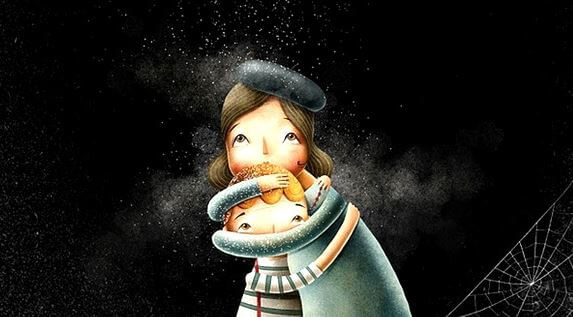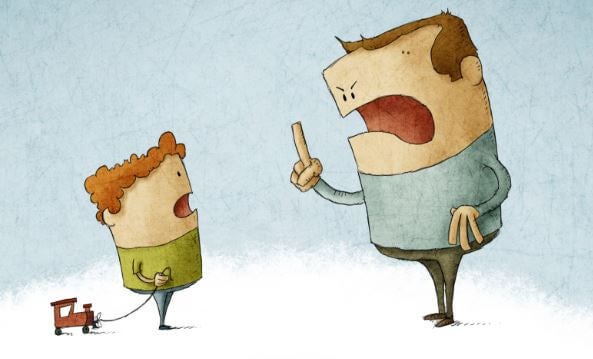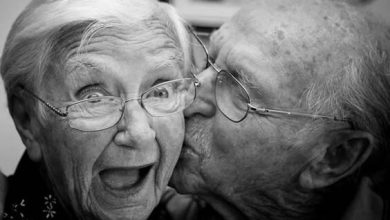5 Emotional Wounds From Childhood That Persist As Adults

In our childhood, emotional wounds can occur. And sometimes we don’t realize how important they are until we reach adulthood. When faced with extreme situations, we are not aware of what is blocking us, what gives us vertigo or what causes us fear.
Many times, the origin is in what we learned when we were children, those emotional wounds that our first experiences with the world have caused us and that we have not been able to heal.
The most important thing is to detect them and avoid putting on makeup. The longer we wait to heal them, the deeper they will go. The fear of reliving the suffering they caused us makes us wear hundreds of masks that will only hinder our passage through life.
Betrayal, humiliation, distrust, abandonment, injustice … These are some of the wounds that Lisa Bourbeau points out to us in her book The five wounds that prevent being oneself. Let’s see below how we can identify them:
Emotional wounds that can affect adulthood
1. The fear of abandonment
Helplessness is the worst enemy of those who experienced abandonment in their childhood. Imagine how painful it must be for a child to feel the fear of being alone, isolated and unprotected in the face of a world they do not know.

It is one of the most important emotional wounds. When the helpless child is an adult, he will try to prevent the fact of being abandoned again.
Therefore, whoever has suffered it, will tend to abandon both their partners and their projects early. This responds, solely and exclusively, to the fear that causes him to relive that suffering.
It is very common for these people to speak or think in this way: “I leave you before you leave me”, “no one supports me, I am not willing to bear this”, “if you leave, do not come back …”.
These people will have to work on their fear of loneliness, their fear of being abandoned and their rejection of physical contact (hugs, kisses, sexual contacts…).
These types of emotional wounds are not easy to heal, but a good start to healing them is to face the fear of being alone. Later, if all goes well, a positive and hopeful internal dialogue will emerge.
2. The fear of rejection
The emotional wounds caused by the fear of rejection prevent us from accepting our feelings, our thoughts and our experiences.
Its appearance in childhood is caused by the rejection of parents, family or peers. The pain that is generated by this wound prevents an adequate construction of the self-esteem and self-esteem of the person who suffers it.
It generates thoughts of rejection, of being unwanted and of disqualification towards oneself. That rejected child does not feel worthy of affection or understanding and isolates himself for fear of experiencing this suffering again.
If this is your case, take care of your place, take risks and make decisions for yourself. It will bother you less and less when people leave and you will not take it personally that they forget about you at some point. You are the only person you need to live.
3. The humiliation
Emotional hurts from humiliation appear when we feel that others disapprove and criticize us. In children, it is generalized by constantly telling them that they are clumsy, bad or annoying, as well as airing their problems before others (something that is, sadly, very common).
This undoubtedly destroys children’s self-esteem and therefore makes it difficult to cultivate healthy self-esteem.

The personality type that is frequently generated is a dependent personality. Furthermore, we may have learned to be “tyrant” and selfish as a defense mechanism, and even to humiliate others as a protective shield.
Having suffered these types of emotional wounds requires that we work on our independence, understanding our needs, fears and priorities.
4. Betrayal or fear of trusting
These emotional wounds are opened when people close to the child do not keep their promises, causing him to feel betrayed and cheated. As a consequence, a distrust is generated that can be transformed into envy and other negative feelings, for not feeling worthy of what was promised and what others have.
Suffering from these problems in childhood builds controlling and perfectionist personalities. They are people who want to have everything tied up and tied up, leaving nothing to chance.

If you suffered from these problems in childhood, you probably feel the need to exercise some control over others. This is often justified by the presence of a strong character. However, let’s say it obeys a defense mechanism, a protection shield against disappointment.
These people have to work on patience, tolerance and knowing how to live. Also learn to be alone and delegate responsibilities.
5. Injustice
The emotional wounds of injustice come into play in homes where the primary caregivers are cold and authoritarian. Excessive demand creates feelings of ineffectiveness and worthlessness, both in childhood and in adulthood.
Albert Einstein synthesized this idea very well with his well-known phrase “We are all geniuses. But if you judge a fish by its ability to climb a tree, it will live its whole life believing that it is stupid. “
As a consequence, whoever experiences this pain may become a rigid person who does not accept half measures in any order of his life. They are usually people who try to be very important and achieve great power.
It is likely that a fanaticism has been created for order, perfectionism, even for chaos. The point is that they are people who radicalize their ideas. For this reason they have difficulties to make decisions with confidence.
To deal with these problems, it is necessary to work on suspicion and mental rigidity, in order to generate greater flexibility and allow trust in others.
Now that we know the five childhood emotional wounds that can affect our well-being, you can detect them and begin to heal them.
Source of the idea: Bourbeau, L. (2003) The five wounds that prevent being oneself. OB Stare.
Main image courtesy of © wikiHow.com









